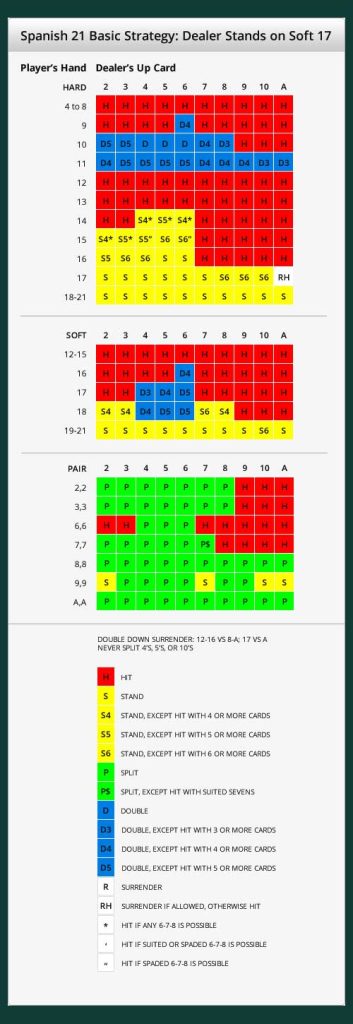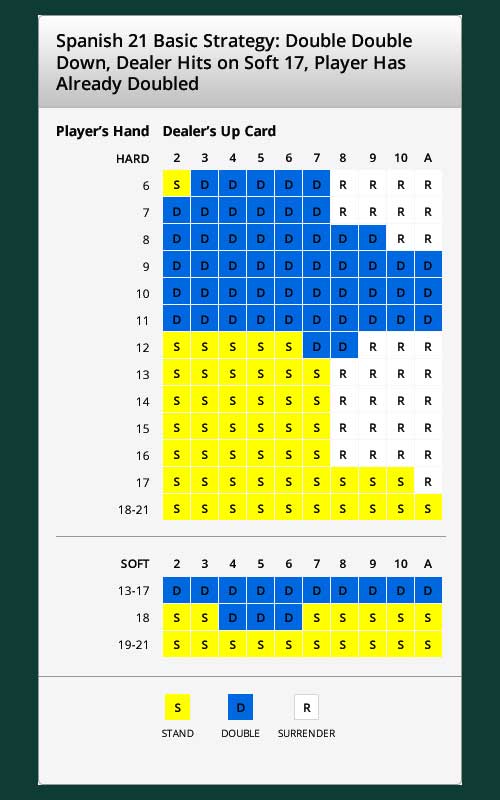Spanish 21, a variant of blackjack, comes with a unique set of rules:
- Deck Composition: Played with 48-card decks, with the 10s removed.
- Player Advantage: Player’s blackjack always beats the dealer’s, and a player’s 21 always wins.
- Doubling and Splitting: Players can double on any number of cards, re-double once, and surrender after doubling down.
- Dealer Play: He hits on 16 and can hit or stand on a soft 17.
- Bonus Payouts: Several bonuses exist, such as 5-card 21s, various combinations of 6-7-8 or 7-7-7, and more.
Basic Strategy
The strategy in Spanish 21 varies depending on the number of cards in your hand and whether or not you’ve doubled. Here’s a simplified version of the strategy.
Without Doubling:
For a hand of 5-7, hit; for 8, double if dealer has 3-4, otherwise hit.
For hands of 9-11, doubling is often recommended, depending on the dealer’s card.
For a hand of A,2 to A,9, the strategy varies from hitting to standing, based on the dealer’s card and the composition of your hand.
After Doubling:
Continue to hit or stand based on the dealer’s face-up card and your current hand.
In some situations, surrender is a viable option if the hand strength is weak against the dealer’s card.
Spanish 21 Strategy Chart




Strategy When Player Has Not Doubled
| Your Hand | Dealer’s Face-up Card | |||||||||
| 2 | 3 | 4 | 5 | 6 | 7 | 8 | 9 | 10 | A | |
| 5-7 | H | H | H | H | D | H | H | H | H | H |
| 8 | H | H | H | D | D | H | H | H | H | H |
| 9 | H | D3 | D | D | D | H | H | H | H | H |
| 10 | D4 | D4 | D | D | D | D4 | D4 | H | H | H |
| 11 | D3 | D4 | D4 | D4 | D4 | D4 | D4 | D3 | D2 | D2 |
| 12 | H | H | H | H | H | H | H | H | H | H |
| 13 | H | H | H | H | S3* | H | H | H | H | H |
| 14 | H | H | S3* | S4* | S5* | H | H | H | H | H |
| 15 | S3* | S4* | S5 | S5 | S | H | H | H | H | H |
| 16 | S5 | S5 | S5 | S | S | H | H | H | H | R |
| 17 | S | S | S | S | S | S | S5 | S5 | S5 | R |
| 18+ | S | S | S | S | S | S | S | S | S | S |
| A,2 | H | D2 | D | D | D | H | H | H | H | H |
| A,3 | H | D2 | D3 | D | D | H | H | H | H | H |
| A,4 | H | H | D3 | D3 | D4 | H | H | H | H | H |
| A,5 | H | H | D2 | D3 | D4 | H | H | H | H | H |
| A,6 | H | H | D2 | D3 | D4 | H | H | H | H | H |
| A,7 | S3 | S3 | D3 | D4 | D5 | S5 | S3 | H | H | H |
| A,8 | S | S | S | S | S | S | S | S | S5 | S5 |
| A,9 | S | S | S | S | S | S | S | S | S | S |
| 2,2 | P | P | P | P | P | P | P | H | H | H |
| 3,3 | P | P | P | P | P | P | P | H | H | H |
| 4,4 | H | H | H | D | D | H | H | H | H | H |
| 5,5 | D | D | D | D | D | D | D | H | H | H |
| 6,6 | H | H | P | P | P | H | H | H | H | H |
| 7,7 | P | P | P | P | P | P* | H | H | H | H |
| 8,8 | P | P | P | P | P | P | P | P | P | R |
| 9,9 | S | P | P | P | P | S | P | P | S | S |
| 10,10 | S | S | S | S | S | S | S | S | S | S |
| A,A | P | P | P | P | P | P | P | P | P | P |
| H | Hit | |||||||||
| S | Stand | |||||||||
| S# | Stand on # or fewer cards, otherwise Hit | |||||||||
| S* | Stand unless 6/7/8 bonus is possible | |||||||||
| D | Double | |||||||||
| D# | Double on # or fewer cards, otherwise Hit | |||||||||
| P | Split (Pair) | |||||||||
| P* | Split unless suited 7s (possible bonus) | |||||||||
| R | Surrender if possible, otherwise Hit | |||||||||
Strategy When Player Has Doubled
| Your Hand | Dealer’s Face-up Card | |||||||||
| 2 | 3 | 4 | 5 | 6 | 7 | 8 | 9 | 10 | A | |
| 7 | D | D | D | D | D | D | R | R | R | R |
| 8 | D | D | D | D | D | D | D | D | R | R |
| 9 | D | D | D | D | D | D | D | D | D | D |
| 10 | D | D | D | D | D | D | D | D | D | D |
| 11 | D | D | D | D | D | D | D | D | D | D |
| 12 | S | S | S | S | S | D | D | R | R | R |
| 13 | S | S | S | S | S | S | R | R | R | R |
| 14 | S | S | S | S | S | S | R | R | R | R |
| 15 | S | S | S | S | S | S | R | R | R | R |
| 16 | S | S | S | S | S | S | R | R | R | R |
| 17 | S | S | S | S | S | S | S | S | S | R |
| 18+ | S | S | S | S | S | S | S | S | S | S |
| A,2-A,6 | D | D | D | D | D | D | D | D | D | D |
| A,7 | S | S | D | D | D | S | S | S | S | S |
| A,8+ | S | S | S | S | S | S | S | S | S | S |
| S | Stand | |||||||||
| D | Double | |||||||||
| R | Surrender | |||||||||
It’s highly recommended that you refrain from aiming for the bonus payouts, and you should avoid placing any extra side bets that require an additional cost for eligibility. It’s also important to note that while surrendering your hand is an option in the game, it’s far from always a profitable move. The reduced presence of 10-value cards in the game significantly decreases the likelihood of busting on many hands, making it often more advantageous to draw another card. Beginners to the game frequently overuse the surrender option, particularly those accustomed to traditional blackjack.
If you like gambling and betting, you may find our odds betting calculator useful.
Close Call Strategies
There are several “close call” situations in Spanish 21 where strategy recommendations may differ, such as 5/6 vs dealer 6 (double vs hit), 13 vs dealer 6 (hit vs stand), and A2/3 vs dealer 3 (double vs hit). These require careful consideration and may depend on the specific rules of the table you’re playing at.
If you like gambling and betting, you may also find our odds betting calculator useful.
FAQ
The main differences include the removal of 10s from the deck, player blackjack and 21 always winning, and various bonus payouts.
Yes, players can double down on any number of cards and even after splitting.
They include payouts for 5-card 21s, unsuited/suited 6-7-8 or 7-7-7 combinations, and more.
No, strategies can vary, especially in close call situations, and often depend on the specific rules at the table.
